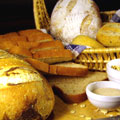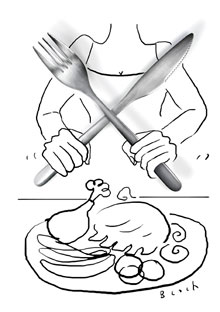Fatigue is one of the biggest problems of modern life. But most of us deal with the problem in all the wrong ways. We want a magic bullet--an energy bar or supplement or tonic that will make us feel like a superhero.
So is there an easy and quick solution to our energy crisis? Yes and no.
Yes, in that there are simple strategies that you can put into effect immediately. They will make a huge difference to your well-being and sense of energy and vitality. The caveat is that energy loss can result from a complicated interplay of factors. No single nutrient or tactic will likely fill your energy deficit. If you have persistent low energy, you should consult your doctor. A thyroid problem can explain a prolonged lack of pep.
Energy is the natural byproduct of certain lifestyle decisions. Consuming fewer calories is one of the easiest ways to boost your vitality. When you eat, blood is diverted to your stomach and gut and energy is spent on digestion. Simply cutting calories by about one-fourth will hike your energy and extend your life, according to multiple studies.
Not quite as easy as cutting calories is a practice I call detox. I'm not talking about a packaged detox kit like Master Cleanses. Just eat clean for a week. Try Dr. Elson Haas' SNACC program: Cut out all SNACCs (Sugar, Nicotine, Alcohol, Caffeine and Chemicals) and limit your menu to raw foods like nuts and seeds, berries and fruits, tons of vegetables, small portions of cooked non-gluten grains like oatmeal (or quinoa), 3-4 ounces of grilled or steamed fish or grass-fed beef a day, and lots of fresh vegetable juice and broths. You'll feel amazing, and your energy will go through the roof.
Supplements can also help. While they don't really give you energy, they can correct metabolic issues that are draining it. Coenzyme Q10, for instance, is a powerful antioxidant that is also fuel for the heart. Supplements can speed along certain metabolic pathways that are nutrient dependent and that get sluggish (and energy-draining) when those nutrients are in short supply.
As everyone knows, stress saps energy. When you're under stress, your body pumps out hormones such as cortisol and adrenaline. Called the "fight or flight" hormones, they serve a great evolutionary purpose: They prepare your body for an emergency. But they were never meant to be turned on all the time. High levels of the hormone cortisol shrink the hippocampus, an important part of the brain needed for memory and thinking. Meditation is the best stress-buster on the planet, but deep breathing exercises work equally well, as do warm baths, walks in the woods or just taking some time out every day to relax.
Another great stress reducer that also energizes: exercise. Though many folks feel like they don't have the energy to work out, the paradox is that exercise makes you feel more energized, not less. A short, equipment-free 15-minute routine like running, squats or push-ups will send oxygen and nutrients to the brain, improve circulation, get feel-good endorphins flowing through your body and ultimately make you feel like a million bucks. No kidding!
Jonny Bowden, Ph.D., CNS, is a board-certified nutritionist and the author of seven books on health and nutrition, including The 150 Most Effective Ways to Boost Your Energy and The 150 Healthiest Foods on Earth.
RULES TO LIVE BY :
1. Eat Fewer Calories
Ever notice how tired you get after a big meal? When you eat, blood is diverted to your stomach and gut and energy is spent on digestion. Follow this Okinawan mantra--"Hara hatchi bu"--which means "eat till you're 75% full." Simply decreasing your calories by one-fourth has been shown to extend life in every species studied.
2. Never Skip Breakfast
Studies show that breakfast eaters perform better on tasks, think more clearly, have more energy and are far less likely to be overweight or obese. Eat protein. One study showed that a high-protein breakfast stimulated metabolism for over 24 hours. The ideal breakfast for energy? Two eggs and a small bowl of oatmeal. Skip the toast and potatoes.
3. Sleep
Even one hour of under-sleeping impairs judgment, performance and energy. During sleep, important hormones and biochemicals are replenished. When you don't get enough sleep, you're at a metabolic disadvantage. Try going to bed one hour earlier than usual. It's more effective than trying to sleep in. 7 - 8 hours is ideal. Kids (0-19) should aim for 10 - 12 hours. Researchers have linked the increase in cases of depression and other mental illnesses in our youth to the declining amount of sleep they get.
4. Exercise
Here are some "no excuses" low-tech workouts that you can do just about anywhere in as little as 15 or 20 minutes for an amazing boost in energy: 1) Run a mile, 2) do some squats, 3) do some push-ups, 4) do some crunches. Or try some jumping jacks in your office, or run the stairs.
5. Supplement
Supplements can correct metabolic issues and increase speed along certain metabolic pathways that are nutrient dependent and get sluggish when those nutrients are in short supply. One terrific energizing nutrient is Coenzyme Q10, a powerful antioxidant that is also fuel for the heart. Also consider vitamin D and a high-quality B complex vitamin.
6. Detox
I recommend Dr. Elson Haas's SNACC program: cut out all SNACCs (Sugar, Nicotine, Alcohol, Caffeine and Chemicals) for a week or so. Limit your menu to raw foods like nuts, berries and fruits, tons of vegetables, small portions of cooked non-gluten grains like oatmeal or quinoa, 3-4 ounces of grilled or steamed fish or grass-fed beef a day, and lots of fresh vegetable juice and broths. You'll feel amazing, and your energy will go through the roof.
7. Combat Stress
When you're under stress, your body pumps out hormones such as cortisol and adrenaline that prepare your body for an emergency. They were never meant to be turned on all the time. Meditation is the best stress-buster on the planet, but deep breathing exercises work equally well, as do warm baths, walks in the woods or just taking some time out every day to relax.
8. Check Your Thyroid
The old saying "my get up and go got up and went" describes a person with hypothyroidism (low thyroid). The thyroid gland is your metabolic engine, and when it's not putting out enough juice, your energy goes down the drain. At the very least, get a TSH test, the first level of screening for thyroid problems.
9. Get Some Sun
The body makes vitamin D after exposure to sun, and experts now agree that we're woefully lacking in this essential vitamin, which has been linked to lower rates of cancer, higher physical performance and improved mood. Try to get 10 minutes of unprotected exposure to the sun at least three times a week.
10. Organize
Here's a rule I've found to be a universal truth: Your energy has an inverse relationship to the accumulation of stuff you don't need. The more unwanted, unused, unneeded stuff you have cluttering up your life, the less energy you have. Take time to organize and de-clutter. It truly feels your mind and spirit.
11. Stay Connected
In his landmark book The Blue Zones, National Geographic explorer and writer Dan Buettner reports on four areas in the world where people live the longest and healthiest lives and are frequently active, energetic and healthy into their late 90s. Every one of the people he studied listed strong social connections as one of the energizing forces in their lives. So invest in your friendships and family, nurture those relationships... they pay.
Take Care
Florence x.
Search Charleston, SC Properties Online








 This is a small area lying between the thalamus and pituitary.
This is a small area lying between the thalamus and pituitary.
